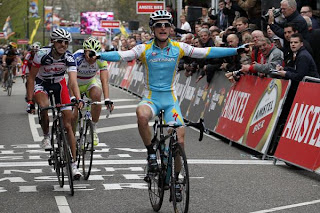July 8, Stage 8: Belfort - Porrentruy 157.5km
Pinot rides to glory in Porrentruy
Thibaut Pinot (FDJ-BigMat) pulled off a famous home victory in stage 8 of the 2012 Tour de France. The Tour’s youngest competitor passed leader Frederik Kessiakoff (Astana) with 17km to race and launched a bold attack that left him with enough of a gap to hold off a host of big name challengers who pursued him intensely, but ultimately in vain, over the final kilometres. There were ecstatic scenes of jubilation from the home fans and from Pinot’s team as he crossed the line with 26 seconds to spare.
Cadel Evans (BMC) took second place ahead of Tony Gallopin (RadioShack-Nissan). Team Sky’s Bradley Wiggins kept his GC rival Evans comfortably in his sights and retained the yellow jersey with his fourth placed finish.
"Those were the longest ten kilometers of my life," Pinot said afterward. "When I saw 10km to go and the peloton was coming back, I was really afraid."
Pinot was able to take advantage of having a teammate in the breakaway all day, and he dedicated the victory to Jeremy Roy. "When Jeremy [Roy] was away I wasn't really riding, and then he truly sacrificed himself for me. I'm really happy."
The young Frenchman looked set to take over the white jersey from Cofidis's Rein Taaramae, but the Estonian battled back to come in 2:21 behind the winner to save his best young rider classification.
Pinot was overjoyed with his stage victory, but played down his chances for the overall classification. "Tomorrow my legs will really hurt so I have no real plans for the rest of the Tour, I will take it day by day."
The tone for the 157km stage, which contained a grand total of seven categorised climbs, was set very early on as Jens Voigt (RadioShack-Nissan) led an early break of ten riders. Within a few kilometres Voigt was on his own but a few minutes later he was passed and dropped by Roy.
As Roy ploughed a lone furrow up the road, 60km in there was a major crash involving three Spaniards – Samuel Sanchez, Jorge Azanza (both Euskaltel-Esukadi) and Alejandro Valverde (Movistar). In the end it was Sanchez who came off worst, with the 2008 Olympic road race champion having to withdraw with injuries that include a broken collarbone and a dislocated shoulder. It will take a miracle for him to be declared fit to defend his Olympic title in London at the end of this month.
Meanwhile, further up the road, Roy was caught by Kessiakoff with just over 80km to go and the two men worked together to build a healthy lead over the rest of the pack. Pinot then made his first significant move of the afternoon, attacking from the main peloton and forming part of a large 22-man group that went off in chase of the two leaders.
Shortly before the fifth categorised climb of the day – the Cote de Saulcy – Pinot launched a successful bid to bridge the gap to the leading duo, joined by Kevin de Weert (Omega Pharma-QuickStep) and Steven Kruiswijk (Rabobank). Kessiakoff responded immediately and attacked, opening up a lead that peaked at 1:45 and one that he would hold until well inside the final 20km.
Pinot and Tony Gallopin (RadioShack-Nissan) burst clear of the pack and Pinot eventually proved the stronger, passing Kessiakoff with 17km left – just at the top of the final Col de la Croix climb. He then made a daring bid for the winning line on the fast descent into Porrentruy, chased by some of the race’s biggest favourites. Evans, Wiggins, Nibali, Menchov and Frank Schleck were amongst the names that went off in hot pursuit of the youngster.
With these stellar names bearing down on him, it would have been excusable if such a relatively inexperienced rider buckled. But the 22-year-old, who rode through his home town on yesterday’s seventh stage, held his nerve impressively and had time to savour the final 200 metres before celebrating what is easily the biggest win of his highly promising career to date.
As for Wiggins, he find himself in a commanding position - tomorrow's stage is a 41.5km individual time trial that should play to his strengths. But as he revealed on the Team Sky website after the finish, today's stage wasn't as easy as he had anticipated.
"That stage was a lot harder than I expected it to be," he said. "The boys were incredible again today and really marshalled the race. They set us up to be able to go with the others on that last climb.
"Early on we had to wait to let the right break go, and that took a long time and a lot of work. We were racing from the off and that didn’t stop for two hours really. The peloton was decimated and it was a tough day for a lot of people. We’re still in a fantastic position after this first week and that’s two tough days down now. We’ve got a time trial ahead of us now and then a rest day."
Full Results
| # | Rider Name (Country) Team | Result | |
|---|---|---|---|
| 1 | Thibaut Pinot (Fra) FDJ-Big Mat | 3:56:10 | |
| 2 | Cadel Evans (Aus) BMC Racing Team | 0:00:26 | |
| 3 | Tony Gallopin (Fra) RadioShack-Nissan | ||
| 4 | Bradley Wiggins (GBr) Sky Procycling | ||
| 5 | Vincenzo Nibali (Ita) Liquigas-Cannondale | ||
| 6 | Jurgen Van Den Broeck (Bel) Lotto Belisol Team | ||
| 7 | Christopher Froome (GBr) Sky Procycling | ||
| 8 | Denis Menchov (Rus) Katusha Team | ||
| 9 | Haimar Zubeldia Agirre (Spa) RadioShack-Nissan | ||
| 10 | Frank Schleck (Lux) RadioShack-Nissan | 0:00:30 |
.jpg)











